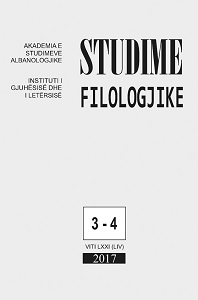Midis detyrës dhe përgjegjësisë për ndryshime estetike
Among the Duty and Responsibility for Aesthetic Changes
Author(s): Arian LekaSubject(s): Cultural history, Studies of Literature, Aesthetics, Political history, Albanian Literature, WW II and following years (1940 - 1949), Post-War period (1950 - 1989), History of Communism
Published by: Qendra e Studimeve Albanologjike
Keywords: Albanian Communist Party; beauty; aesthetics;
Summary/Abstract: After the Albanian Communist Party came to power, the Beauty, as an aesthetic category, received less attention in front of the new mission which literature held on. The faithful reflection of reality was not enough for the new art. As well as the simple mimetic production was not required. The purpose of the new literature was “the true reproduction of typical characters in typical circumstances,” as F. Engels suggested. This meant that the production of new aesthetics in this case, as E. Dobrenko noticed, comes through the re-adaptation of the Marxist equation to workers "Commodity – Money – Commodity" to "reality-realism socialist-reality". The refutation of the Beauty from the new proletarian art, which had appeared also in the Albanian’s literary horizon, did not come as a result of any rejection of this concept by the postmodernist factor. The negation of the Beauty came due to the involvement of realist socialist literature in the same structure with propaganda and ideology. The first group of Albanian authors of the 1945s-1950s, considered the Beauty as a true and exact reflection of the reality. While for the second group, of the 1960s, the idea of describing reality was converted into the idea of transforming the reality by literature. While the first group had simply created a simulation of reality, as a reflection/imitation of a process, that actually takes place in life, the authors of the second group had created a form of realism that describes imaginary realities, future and expected realities, which produced a simulacrum, as J. Baudrillard named the practice. The simple question is: did realism exist in the socialist realism method? The debate on realism in the Albanian literature after the 1950s, developed between “traditionalists” and so-called “modern” poets. Without any new stylistic researches, the poets of the first group reflected the heroism of the WWII and the experiences of the first stages of the motherland's reconstruction. The poets of 1960-s refused to collect simplified impressions from their metric museum and also the stylistics of the ancestors. They opposed as an “avant-garde demiurge”. Their poetry addresses to the skies more than to the earth. It retains the “messianic inspiration” of the messengers on the new (communist) planet, which speaks about the future to the mass. This generation of poets did not take over the reflection of the daily life. They offered the future of Albania, but still inherent in the future of socialism. The Albanian poetry of 1960s inherits also some of the formal features of Russian futurism and some other points from the Italian Manifesto of Futurism. This is reflected in the launched of city subject, cosmos theme, technological-industrial dreams, metropolitan future and the refutation of any past legacy. In formal terms it seems that some similarities are found between socialist realism and the futurist movement, but, more than decades later on, their compliance are noticed mostly in rhetorical fields. The opposition between “traditionalists” and “modernists” in Albanian literature was not included just in aesthetic categories, but for literary influence and territories too. This war, which began as a struggle between “classical rhyme” and “free verse”, did not ends only on expressional terms. It touched the thematic issues too. One such it among others was the theme of Eros, the love poetry. It began killing the sentimental hero of the years 1945s-1950-s, to replace him with a militant Eros of poetry of the 1960s, which was rarely a lyric one. Despite the differences, the poetry of those years remained a diligent implementator of the utopian project and the poets as “soul engineers”, which directed the reality toward that particular form of realism that did not respond to reality, but to socialism. This process treated the Socialism as an aesthetic category, with the same equivalence as the Beauty itself.
Journal: Studime Filologjike
- Issue Year: 2017
- Issue No: 03-04
- Page Range: 59-73
- Page Count: 15
- Language: Albanian

